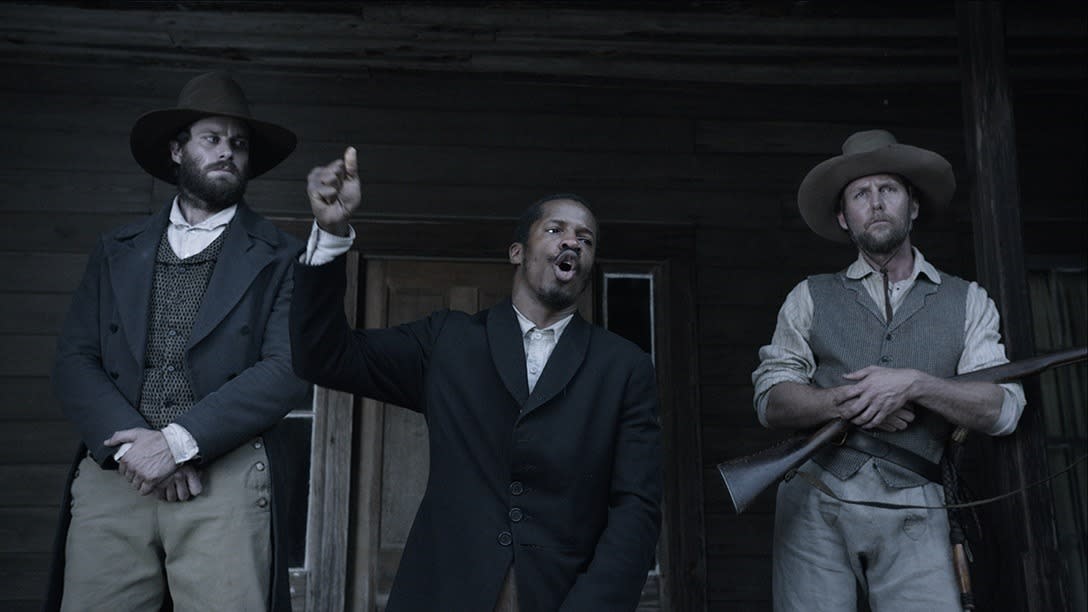Sundance Report: Declaring Slave Rebellion Drama 'The Birth of a Nation' 2017's First Oscar Contender

Nate Parker (with Armie Hammer and Jayson Warner Smith) in ‘The Birth of a Nation’ (Sundance Film Institute)
Consider this an official declaration: The Birth of a Nation is the first major contender for the 2017 Oscars.
Nate Parker’s period drama about Nat Turner, the black preacher who led a bloody insurrection against Virginia slave owners in 1831, was adoringly received at its Monday afternoon Sundance screening, drawing several standing ovations at the cavernous Eccles Theatre. It was a rapturous and cathartic appreciation for the 36-year-old actor’s ambitious first feature as a writer and director, which he spent seven years fighting to finance and make. (Update: The film sold for a Sundance-record $17.5 million to Fox Searchlight on Monday morning).
Parker, who starred in 2014’s cult hit romance Beyond the Lights and the Denzel Washington film The Great Debaters, not only wrote and directed The Birth of a Nation, but also plays its central character. After the screening, he told the audience that Turner has long been his hero, and that he felt an urgency to tell the historic rebel’s story to a country that he feels has whitewashed its own history, especially when it comes to its greatest shame: Race relations (or lack thereof).
The Birth of a Nation makes no bones about the unthinkable evils of slavery. Women (including Turner’s wife Cherry, played by Aja Naomi King) are viciously raped for sport, men are shot like dogs in the street, and slaves on hunger strikes are force-fed gruel after having their teeth chiseled out of their heads. Parker’s camera never lingers on the scenes, but even quick glimpses at the brutality are enough to remind the viewer that these unconscionable crimes against humanity were legal and in fact encouraged in this country — and really, not all that long ago.
Related: Sundance Report: This Is What It’s Like to Be Trapped in a Nightmarish Cult for Two Decades
Turner, a deeply religious man who was taught to read the Bible by a relatively kind slave owner (Penelope Ann Miller) when he was a child, begins his ascent to Christ-like figure when he’s sent from plantation to plantation to preach to fellow slaves. It’s an uncomfortable arrangement he’s been forced into by his owner, Ben (Armie Hammer), who has run into financial trouble during a summer drought. The local reverend tells Ben, who grew up with Nat and is decent by the extremely low bar of the era’s slave-owner standards, that other farmers would be willing to hire Turner to preach (and ostensibly quiet any murmurs of rebellion).
What Nat sees during these trips, however, winds up opening his eyes more fully to the injustices inflicted upon his people, and changes his interpretation of the scripture. It’s that journey — along with a whipping for baptizing a man that leaves Turner sprawled out on the stock like Christ on the cross — ultimately inspires the 48-hour rebellion that shook the antebellum south 30 years before the Civil War. The imagery is laid on thick and the allegory quite obvious, but then, it’s impossible to deny Turner his due as a messiah-like figure. And while the film has its other flaws — it would have been nice to have other developed characters, for one — its urgency and subject matter make it a compelling watch and obvious awards contender.
While slavery was abolished 150 years ago, it’s impossible not to see in the violence in Parker’s film a reflection of the steady stream of police brutality videos that has sparked nationwide protests today. And though making movies is in many ways a luxury, the persistent gap in on-screen representation is a vexing problem that is also implicitly touched upon by The Birth of a Nation. People have long wanted to make a film about Turner, and it was an epic struggle to get this film made — Hollywood’s conventional wisdom is that non-white leads don’t sell tickets overseas, and even Parker’s own financiers told him it was a silly investment (its sale price, of course, proved them very, very wrong). This uphill climb was evident by the huge number of producers that Parker invited on stage for his Q&A; there are 23 people listed as producers or exec producers, including the all-star athletes Tony Parker, Michael Finley, and Derrick Brooks. Nate Parker put his career on the line for this movie — he even told his agent that he refused to act in anything else until he got it made — and in its own way, it represents a rebellion against the establishment.
Related: Sundance Film Festival Preview: 15 Movies We Can’t Wait to See
Which is why, in this context, it is so important to proactively declare the film — which reclaims the title of D.W. Griffith’s century-old cinematic ode to the KKK — an Oscar contender.
The backlash to the second straight year of all-white Oscar nominees in the acting categories has been loud and at least superficially effective, with major stars boycotting the ceremony and the Academy moving to drastically diversify its body of voters. And while the underlying problem won’t really change until the film industry begins to make movies that reflect the rich color palette that is modern America, it is impossible to ignore the role that journalists and awards prognosticators play in helping to shape the awards season narrative — often, long before any of the movies deemed contenders are even done with production, let alone seen by critics.
There aren’t many buzzed-about contenders for 2017 just yet (the 2016 show is still a month away), so let the campaign for The Birth of a Nation, a socially conscious and urgent film that also seems tailor-made for the Oscars, begin.

